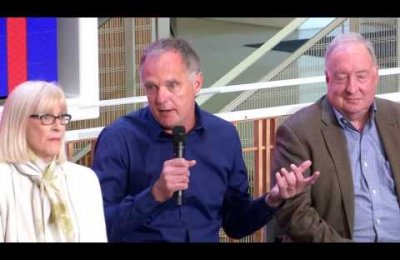At USC Annenberg, we don’t just cover the news, we make it. “Quoted: USC Annenberg in the News” gathers a selection of the week’s news stories featuring and written by USC Annenberg’s leaders, faculty, staff and others. The stories are listed in chronological order, the most recent story appearing first.
'What’s Working' initiative delivers first showcase report
USC News highlighted the recent partnership between USC Annenberg and The Huffington Post, which produced its first showcase piece: journalism student Kate Flexter's video report on a Little Free Library. A second piece was published later in the week: Daina Beth Solomon's story on the Zumba craze, which was first reported for Intersections South L.A.
Sen. Robert Menendez Indictment A Blow to Latino Political Influence
Professor Roberto Suro was quoted in an NBC News article on the federal charges faced by Sen. Bob Menendez. "He is clearly a very significant figure, being the lone Latino Democrat in the Senate and all the more so because there are two Republican Latinos in the Senate and one already has announced he's running for president and another is about to," Suro said. The effect of the indictment is already being felt, as Menendez was planning to step down from his position as top Democrat of the Senate Foreign Relations Committee.
How Tech-Savvy Journalism Students View Innovation
Three students from USC Annenberg were included in the American Journalism Review's story on how students and young journalists use technology in newsrooms. Fernando Hurtado, who works as executive producer of Mobile & Emerging Platforms in the Media Center, told AJR he thinks the next movement in journalism is mini-broadcast using apps like Vine, Snapchat and now Meerkat or Periscope. "Taking the editing and producing outside the newsroom makes stories that are much more powerful," Hurtado said. Google Glass and other wearables may be the future of journalism, Anna-Catherine Brigida told AJR. But then again, maybe there will be an entirely new technology, the Intersections South L.A. reporter hypothesized. “Even if Glass isn’t widely used, the class made us start thinking of how to tell news in a digital world,” Brigida said. “Maybe it will come and go. Maybe I’m not using Glass tomorrow, maybe it’s a new tool. But I’ve learned the mindset to adapt content production to a new tool.” Graduate student Jessica Oliveira discussed the importance of mobile, and highlighted her experience designing apps and coding. "It’s never something I thought reporters would be doing hands on," she said. "While we’re still going out and getting information, being able to create it on these platforms gives you more control."
Colleges Branch Out with Powerful SaaS Apps
EdTech highlighted USC Annenberg's partnership with Adobe to offer students, faculty and staff access to the Adobe Creative Cloud. The article noted the movement in higher education to offer cloud-based apps thus giving everyone a common platform. James Vasquez, associate dean of IT and facilities operations, told EdTech that while moving to Adobe Creative Cloud saved money that was previously used for managing and maintaining computer labs, "the real benefit is that it makes us more mobile and flexible," he said. "Students can work on the tools from anywhere."
Jody Evans Says She Learned to Love her Body from Third World Women
Women's rights activist Jody Evans was a refugee amidst Guinea's civil war in 1999. Her time with the other female refugees taught her lessons in self-image and body appreciation. "Women in the global south live in their bodies much more than we in the global north," Evans said. Since Evans' time, campaigns like Dove’s #speakbeautiful and Always' #LikeAGirl have brought women's body image issues to the forefront of public discussion. Sarah Banet-Weiser, director of the School of Communication, recently contributed her views on the ongoing struggle for women empowerment. According to the LA Weekly article, Banet-Weiser "expressed concern that the corporatizing of the women’s confidence movement is grounded in an economic incentive."
Lee Kuan Yew and the Middle East
Vice Dean Philip Seib offered his evaluation of how the Western media covered the death of Lee Kuan Yew, Singapore's authoritarian leader in a new column for the World Post. "Much of the Western news coverage of the death of Lee Kuan Yew has been characterized by grudging admiration for the rise of Singapore and tut-tutting about Lee's autocratic style," Sieb wrote. Sieb views Yew's form of self-government as highly effective. The disconnect between Yew and our government, however, is due to U.S.'s unyielding faith in the promise of a liberal democracy rather than a respectable autocracy, Seib wrote.
States Are Divided by the Lines They Draw on Immigration
Laws on drivers licenses for undocumented immigrants differ depending on which state they live in. For Ofelia Rosas Ramos, an illegal immigrant living in Seattle, a drivers license is easy to come by. The New York Times reported that, in other states where a social security number is a prerequisite for a license, undocumented individuals face the risk of deportation every day. Professor Roberto Suro is one of many immigration scholars who expressed his concern regarding disparity in state laws. "This case has brought the differences to the surface so vividly because it caused the states to pick sides," Suro said.






